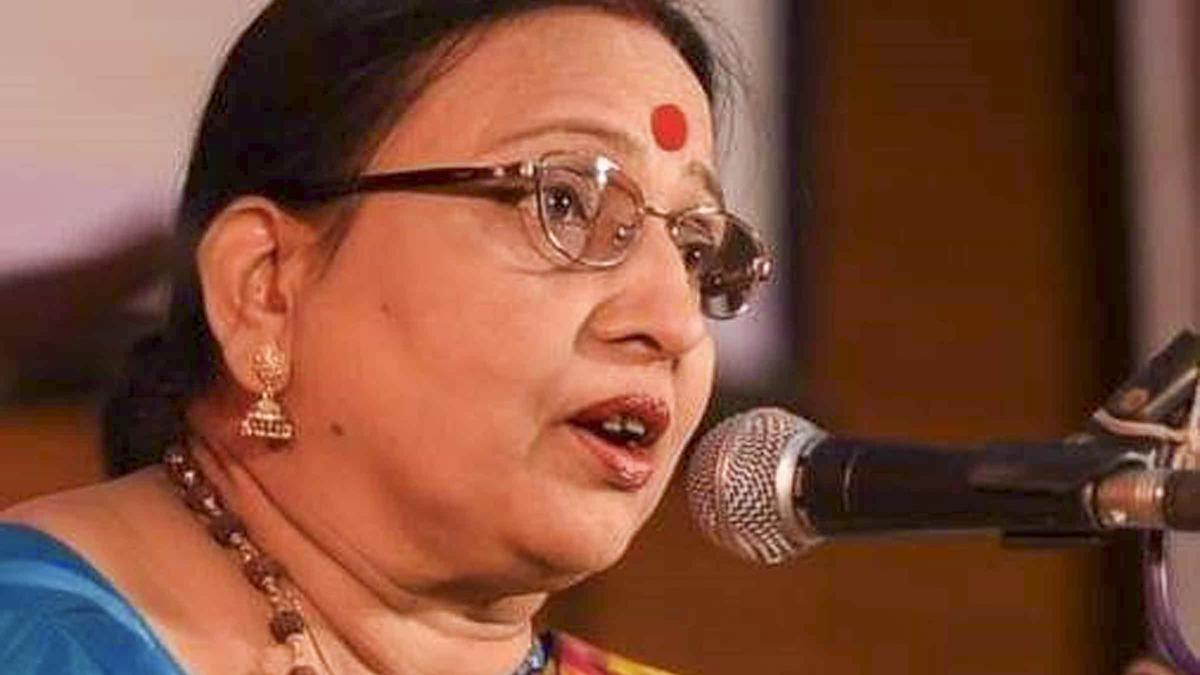
Prominent folk singer and cultural icon Sharda Sinha passed away in Delhi on Tuesday night, November 5, 2024, at the age of 72. Her demise occurred at All India Institute of Medical Sciences (AIIMS), where she was being treated for serious health complications arising from septicemia. According to AIIMS authorities, she passed away at 9:20 p.m. due to refractory shock linked to the condition.
Sharda Sinha was a legend in the realm of Indian folk music, especially celebrated for her contributions through songs in the Bhojpuri, Maithili, and Magahi languages. Her unmistakable voice lent itself to beloved folk tracks such as “Kartik Maas Ijoriya” and “Koyal Bin,” and she also garnered acclaim for Bollywood hits like “Taar Bijli” from “Gangs of Wasseypur- II” and “Babul” from “Hum Aapke Hain Koun.” Her significant influence on music led her to be awarded the Padma Bhushan, highlighting her role in championing traditional music.
Ms. Sinha had courageously fought multiple myeloma, a type of blood cancer, since 2017. Her health had deteriorated further in October when she was admitted to the Institute Rotary Cancer Hospital (IRCH), AIIMS. Despite her battle against illness, she remained a powerful ambassador for folk music, known to many as ‘Bihar Kokila’ for her role in popularizing cultural music during occasions like Chhath Puja and weddings.
The Indian Prime Minister, Narendra Modi, expressed his deep sorrow over Ms. Sinha’s passing, describing it as a colossal loss to the world of music. In a heartwarming tribute, he mentioned how her Chhath festival songs resonated with countless admirers, embodying the spirit of faith and tradition. As he joined the chorus of condolences from across the nation, his acknowledgment underscored the void left by her death in the cultural fabric of India.
Throughout her distinguished career spanning over five decades, Sharda Sinha was not just a singer but a cultural phenomenon.
. Born on November 1, 1952, in Supaul, Bihar, she was drawn to the world of music from a young age. She trained in classical music under eminent gurus like Pandit Raghu Jha and Pandit Sitaram Hari Dandekar, enriching her musical abilities which she later seamlessly infused with folk traditions.
Many admirers revered her voice as a bridge to memories of home, a sentiment echoed by Hriday Narayan Jha, a recurrent collaborator. He fondly recalled her dedication to perfecting her craft without bowing to compromises, bringing to life the lyrical poetry in her music. Her refusal to dilute her folk roots despite offers from mainstream cinema underscored her integrity and commitment to her art.
Apart from her achievements in music, Sharda Sinha also held academic qualifications, being a Nritya Visharad (Manipuri) and earning a master’s degree in Indian classical music, followed by a Ph.D. Her illustrious career saw her perform to audiences worldwide, serving as a cultural ambassador for India in countries including Mauritius, Germany, and Belgium. Within India, she was a ‘top grade’ artist on All India Radio, and her performances were a staple at concerts and festivals.
Her contributions have been recognized with numerous awards, including Sangeet Natak Akademi Award in 2000, Padma Shri in 1991, and Padma Bhushan in 2018. She became an instant sensation with her debut Maithili number “Dularua Bhaiya” in 1971, ushering in a new era of appreciation for Maithili and Bhojpuri folk songs.
In the wake of her passing, Sinha’s legacy continues through her family, particularly her children, who endured another recent tragedy with the loss of her husband, Braj Kishore Sinha. Yet, they remain committed to preserving her influence through the Sharda Sinha Art & Culture Foundation, dedicated to celebrating and preserving the rich cultural heritage of Bihar and north India.
As Ms. Sinha’s journey concluded just days after her 72nd birthday and at the start of the Chhath festival— a deeply significant time for her fans and the communities she empowered through her music—her legacy as a torchbearer of folk music remains ever-present. In her death, as in her vibrant life, her music and spirit continue to echo across generations, forever etching her name in the hearts of those who cherish India’s folk traditions.












